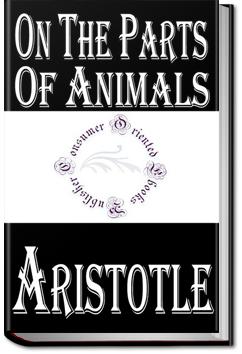UNLIMITED Audiobooks and eBooks
Over 40,000 books & works on all major devices
Get ALL YOU CAN for FREE for 30 days!
On the Parts of Animals
Aristotle
Book Overview:
The first book asks whether animals were designed or came into existence by chance. The remaining three books focus on particular examples of various animals and the functions of their organs. The translator William Ogle, who was both a medical doctor and classicist, presented Charles Darwin with a copy of this translation.
The first book asks whether animals were designed or came into existence by chance. The remaining three books focus on particular examples of various animals and the functions of their organs. The translator William Ogle, who was both a medical doctor and classicist, presented Charles Darwin with a copy of this translation.
How does All You Can Books work?
All You Can Books gives you UNLIMITED access to over 40,000 Audiobooks, eBooks, and Foreign Language courses. Download as many audiobooks, ebooks, language audio courses, and language e-workbooks as you want during the FREE trial and it's all yours to keep even if you cancel during the FREE trial. The service works on any major device including computers, smartphones, music players, e-readers, and tablets. You can try the service for FREE for 30 days then it's just $19.99 per month after that. So for the price everyone else charges for just 1 book, we offer you UNLIMITED audio books, e-books and language courses to download and enjoy as you please. No restrictions.
Try now for FREE!

"Love your service - thanks so much for what you do!"
- Customer Cathryn Mazer
"I did not realize that you would have so many audio books I would enjoy"
- Customer Sharon Morrison
"For all my fellow Audio Book & E-Book regulars:
This is about as close to nirvana as I have found!"
- Twitter post from @bobbyekat



Community Reviews
Parts of Animals by Aristotle and translated into English by William Ogle is an ancient anatomical text. The book like much of Aristotle is a combination of very accurate elements with things that we with modern science consider completely ridiculous. The work starts by explaining the process of sci
We find here a basic, logical look at the structures of animals. Aristotle refutes Empedocles, that traits are entirely incidental, and Democritus, that shape and color constitute the whole animal. We then read about the classification, that bifurcation will never be sufficient to categorize the dif
The parts of animals, as Aristotle sees them, not only are of interest in themselves but also provide evidence of the beauty and intricacy of a harmonious natural order. Such are the impressions that emerge most strongly from a reading of Aristotle’s Parts of Animals.
As Aristotle studied and wrote a
In that age, surely this writing is a fascinated one. I dont know if the translation was true or not. But the translator using many modern classification, like genus, crustaceae, chepalopods, etc. If this words already being used in that time, then the ancient people surely has a keen observations a
This is a very hard book to rate. In the preface Ogle writes about ‘Parts of Animals’ that ‘the simple Aristotelian has been deterred by a subject-matter, as a rule alien to his tastes’. That is correct for me, where Books 2-4 of this volume are almost purely biology instead of philosophy and as suc
Aristotle starts this treatise with the following words:
"Every systematic science, the humblest and the noblest alike, seems to admit of two distinct kinds of proficiency; one of which may be properly called scientific knowledge of the subject, while the other is a kind of educational acquaintance
Aristóteles dá continuidade ao seu "história dos animais" aqui, mas inicia com um foco mais filosófico do que biológico, diferenciando a sua teoria das 4 causas quando aplicado a seres vivos, em relação à aplicação de coisas inanimadas. Não entendi o motivo de não achar esse livro traduzido, em meio
As I don't have much education in Life Science, I was really impressed with this by Aristotle. The more I've read him, the easier it is for me to understand him. Recommended!